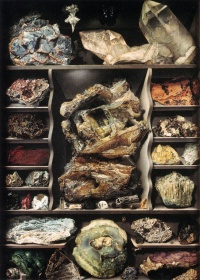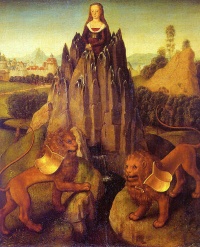Geology
From The Art and Popular Culture Encyclopedia
(Difference between revisions)
| Revision as of 12:26, 5 September 2021 Jahsonic (Talk | contribs) ← Previous diff |
Current revision Jahsonic (Talk | contribs) |
||
| Line 1: | Line 1: | ||
| [[Image:Crystallised Minerals by Alexandre Isidore Leroy de Barde.jpg|thumb|right|200px|''[[Crystallised Minerals]]'' (first half of 19th century) by Alexandre Isidore Leroy de Barde]] | [[Image:Crystallised Minerals by Alexandre Isidore Leroy de Barde.jpg|thumb|right|200px|''[[Crystallised Minerals]]'' (first half of 19th century) by Alexandre Isidore Leroy de Barde]] | ||
| - | [[Image:Allegory of Chastity by Memling.jpg|thumb|left|200px|''[[Allegory of Chastity]]'' (1475) by Hans Memling]] | + | [[Image:Allegory of Chastity by Memling.jpg|thumb|200px|''[[Allegory of Chastity (Hans Memling)|Allegory of Chastity]]'' (1475) by Hans Memling]] |
| + | [[Image:Limestone rock formation in the White Desert, Egypt.jpg|thumb|right|200px|[[Limestone rock formation in the White Desert, Egypt]]]] | ||
| {{Template}} | {{Template}} | ||
| - | '''Geology''' is a branch of [[Earth science]] concerned with the [[solid Earth]], the [[rock (geology)|rocks]] of which it is composed, and the processes by which they change over time. Geology can also include the study of the solid features of any [[terrestrial planet]] or [[natural satellite]] such as [[Geology of Mars|Mars]] or [[geology of the Moon|the Moon]]. Modern geology significantly overlaps all other Earth sciences, including [[hydrology]] and the [[atmospheric sciences]], and so is treated as one major aspect of integrated [[Earth system science]] and [[planetary science]]. | + | '''Geology''' is a branch of [[Earth science]] concerned with the [[solid Earth]], the [[rock (geology)|rocks]] of which it is composed, and the processes by which they change over time. Geology can also include the study of the solid features of any [[terrestrial planet]] or [[natural satellite]] such as [[Mars]] or [[the Moon]]. Modern geology significantly overlaps all other Earth sciences, including [[hydrology]] and the [[atmospheric sciences]], and so is treated as one major aspect of integrated [[Earth system science]] and [[planetary science]]. |
| ==See also== | ==See also== | ||
| - | * [[Beyond Sleep]] | + | * ''[[Beyond Sleep]]'' (1966) by W. F. Hermans |
| - | * [[Geologic modeling]] | + | * [[Natural history]] |
| - | * [[Geoprofessions]] | + | |
| - | * [[Geotourism]] | + | |
| - | * [[Glossary of geology terms]] | + | |
| - | * [[Index of geology articles]] | + | |
| - | * [[International Union of Geological Sciences]] ([[IUGS]]) | + | |
| - | * [[Outline of geology]] | + | |
| - | * [[Timeline of geology]] | + | |
| {{GFDL}} | {{GFDL}} | ||
Current revision

Crystallised Minerals (first half of 19th century) by Alexandre Isidore Leroy de Barde

Allegory of Chastity (1475) by Hans Memling
|
Related e |
|
Featured: |
Geology is a branch of Earth science concerned with the solid Earth, the rocks of which it is composed, and the processes by which they change over time. Geology can also include the study of the solid features of any terrestrial planet or natural satellite such as Mars or the Moon. Modern geology significantly overlaps all other Earth sciences, including hydrology and the atmospheric sciences, and so is treated as one major aspect of integrated Earth system science and planetary science.
[edit]
See also
- Beyond Sleep (1966) by W. F. Hermans
- Natural history
Unless indicated otherwise, the text in this article is either based on Wikipedia article "Geology" or another language Wikipedia page thereof used under the terms of the GNU Free Documentation License; or on research by Jahsonic and friends. See Art and Popular Culture's copyright notice.


